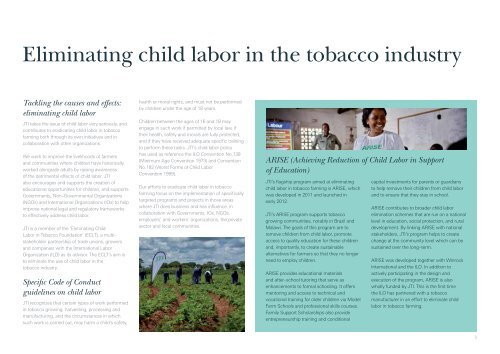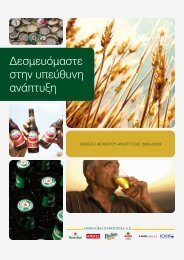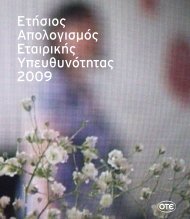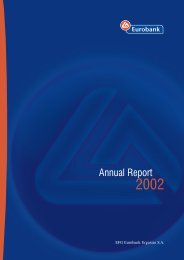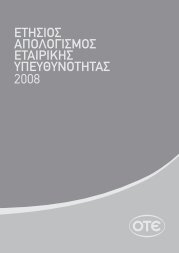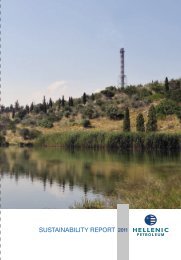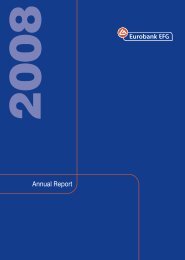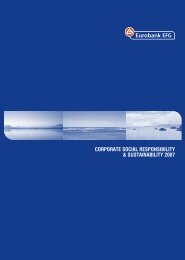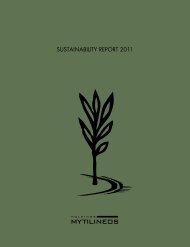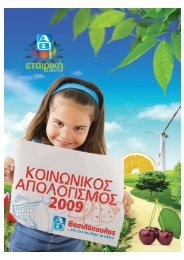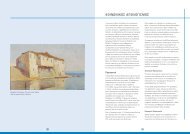Corporate Social Responsibility Report 2012 - EuroCharity
Corporate Social Responsibility Report 2012 - EuroCharity
Corporate Social Responsibility Report 2012 - EuroCharity
Create successful ePaper yourself
Turn your PDF publications into a flip-book with our unique Google optimized e-Paper software.
Eliminating child labor in the tobacco industry<br />
Tackling the causes and eects:<br />
eliminating child labor<br />
JTI takes the issue of child labor very seriously, and<br />
contributes to eradicating child labor in tobacco<br />
farming both through its own initiatives and in<br />
collaboration with other organizations.<br />
We work to improve the livelihoods of farmers<br />
and communities where children have historically<br />
worked alongside adults by raising awareness<br />
of the detrimental eects of child labor. JTI<br />
also encourages and supports the creation of<br />
educational opportunities for children, and supports<br />
Governments, Non–Governmental Organizations<br />
(NGOs) and International Organizations (IOs) to help<br />
improve national legal and regulatory frameworks<br />
to eectively address child labor.<br />
JTI is a member of the ‘Eliminating Child<br />
Labor in Tobacco Foundation’ (ECLT), a multi–<br />
stakeholder partnership of trade unions, growers<br />
and companies with the International Labor<br />
Organization (ILO) as its advisor. The ECLT’s aim is<br />
to eliminate the use of child labor in the<br />
tobacco industry.<br />
Specific Code of Conduct<br />
guidelines on child labor<br />
JTI recognizes that certain types of work performed<br />
in tobacco growing, harvesting, processing and<br />
manufacturing, and the circumstances in which<br />
such work is carried out, may harm a child’s safety,<br />
health or moral rights, and must not be performed<br />
by children under the age of 18 years.<br />
Children between the ages of 16 and 18 may<br />
engage in such work if permitted by local law, if<br />
their health, safety and morals are fully protected,<br />
and if they have received adequate specific training<br />
to perform these tasks. JTI’s child labor policy<br />
has used as reference the ILO Convention No.138<br />
(Minimum Age Convention 1973) and Convention<br />
No.182 (Worst Forms of Child Labor<br />
Convention 1999).<br />
Our eorts to eradicate child labor in tobacco<br />
farming focus on the implementation of specifically<br />
targeted programs and projects in those areas<br />
where JTI does business and has influence, in<br />
collaboration with Governments, IOs, NGOs,<br />
employers’ and workers’ organizations, the private<br />
sector and local communities.<br />
ARISE (Achieving Reduction of Child Labor in Support<br />
of Education)<br />
JTI’s flagship program aimed at eliminating<br />
child labor in tobacco farming is ARISE, which<br />
was developed in 2011 and launched in<br />
early <strong>2012</strong>.<br />
JTI’s ARISE program supports tobacco<br />
growing communities, notably in Brazil and<br />
Malawi. The goals of this program are to<br />
remove children from child labor, promote<br />
access to quality education for these children<br />
and, importantly, to create sustainable<br />
alternatives for farmers so that they no longer<br />
need to employ children.<br />
ARISE provides educational materials<br />
and after–school tutoring that serve as<br />
enhancements to formal schooling. It oers<br />
mentoring and access to technical and<br />
vocational training for older children via Model<br />
Farm Schools and professional skills courses.<br />
Family Support Scholarships also provide<br />
entrepreneurship training and conditional<br />
capital investments for parents or guardians<br />
to help remove their children from child labor<br />
and to ensure that they stay in school.<br />
ARISE contributes to broader child labor<br />
elimination schemes that are run on a national<br />
level in education, social protection, and rural<br />
development. By linking ARISE with national<br />
stakeholders, JTI’s program helps to create<br />
change at the community level which can be<br />
sustained over the long–term.<br />
ARISE was developed together with Winrock<br />
International and the ILO. In addition to<br />
actively participating in the design and<br />
execution of the program, ARISE is also<br />
wholly funded by JTI. This is the first time<br />
the ILO has partnered with a tobacco<br />
manufacturer in an eort to eliminate child<br />
labor in tobacco farming.<br />
9


